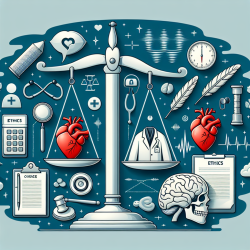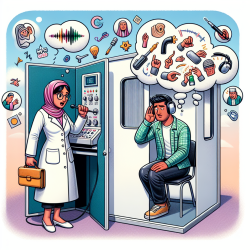Introduction
In the evolving landscape of organ donation, the practice of donation after cardiac or circulatory death (DCD) presents significant ethical challenges. The research paper titled "Recovery of transplantable organs after cardiac or circulatory death: Transforming the paradigm for the ethics of organ donation" by Verheijde, Rady, and McGregor (2007) explores these challenges and suggests a paradigm shift in the ethics of organ donation. This blog post aims to help practitioners improve their understanding and skills by implementing the outcomes of this research or encouraging further exploration.
The Dead Donor Rule and Its Challenges
The dead donor rule, a cornerstone of ethical organ donation, mandates that organ procurement should only occur after the donor is declared dead. However, DCD challenges this rule by raising questions about the precise moment of death. The research argues that the recovery of viable organs in DCD may not align with this rule, necessitating a reevaluation of the ethical and legal frameworks governing organ donation.
Ethical and Legal Implications
The research outlines several deficiencies in the current consent process for DCD, particularly regarding the disclosure of necessary information for informed decision-making. Practitioners must be aware of these issues to ensure that consent processes respect donor autonomy and provide comprehensive information to potential donors and their families.
Alternative Proposals for Increasing Organ Donation
The paper discusses two alternative proposals to increase organ donation consent: presumed consent and mandated choice. Presumed consent assumes that individuals are willing to donate unless they explicitly opt-out, while mandated choice requires individuals to make a decision about organ donation during their lifetime. Each approach has its ethical considerations, and practitioners should be informed about these to engage in meaningful discussions with stakeholders.
Implementing a Paradigm Change
The authors propose a paradigm change to ensure the legitimacy of DCD practice, which includes:
- Societal agreement on abandoning the dead donor rule.
- Legislative revisions reflecting this abandonment.
- Mandated choice to facilitate individual participation in organ donation.
For practitioners, understanding these proposed changes is crucial for advocating for ethical practices and participating in policy discussions.
Conclusion
Practitioners in the field of organ donation must stay informed about the ethical and legal challenges associated with DCD. By understanding the implications of the research by Verheijde et al. (2007), practitioners can contribute to the ongoing dialogue about ethical organ donation and advocate for practices that respect donor autonomy and societal values.
To read the original research paper, please follow this link: Recovery of transplantable organs after cardiac or circulatory death: Transforming the paradigm for the ethics of organ donation.










